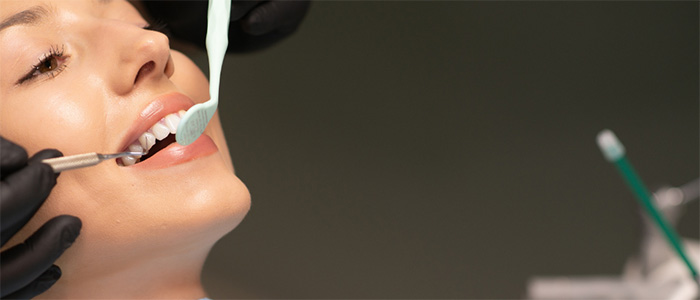
Emergency Dentist: What Counts as a Dental Emergency?
1 November 2025
Smile Myths Busted
1 November 2025Missing teeth can affect much more than appearance. They influence how we eat, speak, and even how our jawbones maintain their shape over time. Two of the most common solutions for replacing missing teeth are dental implants and dentures. While both restore function and aesthetics, they are very different treatments. Understanding the advantages and limitations of each can help you decide which option is right for your needs.
What are dental implants?
Dental implants are small titanium posts surgically placed into the jawbone, where they act as artificial tooth roots. Once the bone heals around the implant, a crown, bridge, or denture can be attached.
Implants are designed to look, feel, and function like natural teeth. They can replace a single missing tooth, several teeth in a row, or even a full arch when combined with implant-supported dentures. Because they integrate directly with the bone, implants provide long-term stability and strength.
What are dentures?
Dentures are removable appliances that replace multiple missing teeth. They can be partial dentures, which fill gaps when some natural teeth remain, or complete dentures, which replace all teeth in the upper or lower jaw.
Modern dentures are custom-made to fit comfortably and restore function. Advances in materials mean they look more natural than ever before. However, they do not fuse with the jawbone in the same way implants do, so they can sometimes move or feel less secure.
Key differences between implants and dentures
- Stability: Implants are fixed in place and do not shift, while dentures may move slightly during eating or speaking.
- Bone health: Implants stimulate the jawbone, preventing bone loss. Dentures rest on the gums and do not provide this stimulation, which may lead to gradual bone resorption over time.
- Longevity: With proper care, implants can last for decades. Dentures generally need adjustments or replacement every 5–10 years as the mouth changes.
- Maintenance: Implants are cared for much like natural teeth, with regular brushing and flossing. Dentures must be removed daily for cleaning.
- Comfort: Implants typically feel more natural, while dentures may take time to adjust to.
Advantages of dental implants
- Strong and stable, allowing patients to eat a wide variety of foods
- Preserve jawbone health by stimulating bone tissue
- Blend seamlessly with natural teeth for a highly aesthetic result
- Do not rely on neighbouring teeth for support
- Long-lasting solution with proper care
Limitations of dental implants
- Require adequate bone for placement — bone grafting may be needed in some cases
- Involve a surgical procedure and healing time
- Higher upfront cost compared to dentures
- Not suitable for everyone, depending on overall health and bone quality
Advantages of dentures
- More affordable upfront compared to implants
- Can replace multiple teeth quickly, often within weeks
- Do not require surgery
- Can be adjusted or remade as needed if oral tissues change
Limitations of dentures
- May feel less stable, particularly lower dentures
- Can cause sore spots on the gums if they do not fit well
- Require daily removal and cleaning
- Do not prevent bone loss in the jaw
- May limit the types of foods that can be eaten comfortably
Which option is right for you?
The decision between implants and dentures depends on individual circumstances, including oral health, lifestyle, budget, and long-term goals. Implants are often preferred for their durability, natural feel, and ability to preserve bone, making them a great choice for those seeking a permanent solution.
Dentures remain a practical alternative for patients who may not be suitable for surgery or who want a quicker, less invasive option. They can also serve as a temporary solution before moving to implants later.
Why professional assessment matters
Choosing between implants and dentures is not just about preference — it requires a detailed examination of the mouth, gums, and bone. A personalised treatment plan ensures the chosen option provides both function and aesthetics, while also supporting long-term oral health.
Taking the next step
If you are missing teeth, there are effective solutions available to restore your smile and confidence. Dental implants and dentures each have unique benefits, and the right choice depends on your individual needs.
Book a consultation today to explore your options and take the first step toward restoring your smile.




